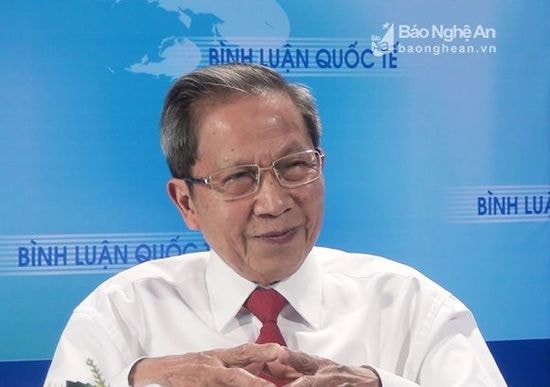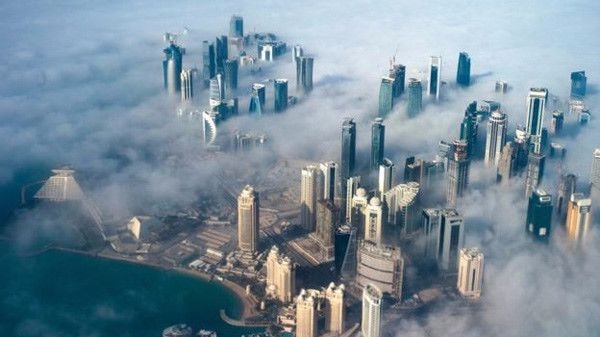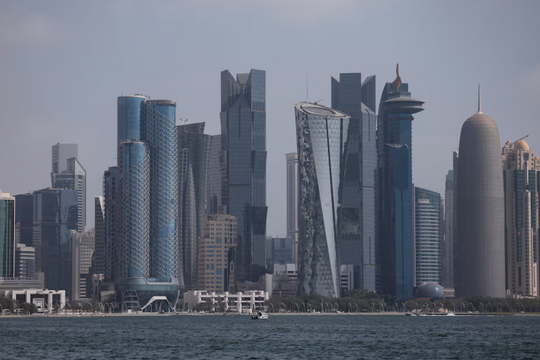General Le Van Cuong talks about the Qatar crisis and the loss of America's role in the Middle East
(Baonghean.vn) - The diplomatic tension between Qatar and its Gulf neighbors is not a sudden issue, but a climax when the conflict has been pent up for many years and has increased. The tension has not shown any signs of cooling down, leading to a series of economic, military and security consequences.
Nghe An Newspaper had an interview on this issue with Associate Professor - Dr. Major General Le Van Cuong, former Director of the Institute of Science and Strategy, Ministry of Public Security.
 |
| Associate Professor, Doctor, Major General Le Van Cuong at Nghe An Newspaper studio on June 19. |
PV: In 2014, there was a conflict between Qatar and the Gulf countries. Could you recall this event, Major General?
Associate Professor, Doctor, Major General Le Van Cuong: Qatar has long been opposed by Saudi Arabia, Egypt, and the United Arab Emirates (UAE) for supporting extremist Islam, especially the Muslim Brotherhood (MB), a group that has been outlawed by both Saudi Arabia and the UAE.
In particular, the diplomatic crisis occurred in March 2014, when Saudi Arabia, the UAE and Bahrain recalled their ambassadors from Qatar because of Qatar's support for then Egyptian President Mohammed Morsi, a member of the Muslim Brotherhood. The ambassadors returned six months later after Qatar "stepped down" and expelled some members of the Muslim Brotherhood, in an attempt to reduce pressure from the Gulf countries.
PV: This crisis is assessed to be much more serious than in 2014. So what are the direct and underlying causes, Major General?
Associate Professor, Dr. Major General Le Van Cuong: The direct cause originated from the media "war" between the parties, after the Qatar State News Agency published the King's statement on the country's foreign policy, which was immediately considered by Saudi Arabia, UAE, and Egypt to be inconsistent with the common interests of the bloc, along with accusations that Qatar supported the self-proclaimed Islamic State (IS) and al-Qaeda terrorist forces.
According to accusations from Arabia, Qatar's leaders seem to want to advise Gulf countries not to embargo or punish Iran - a regional Islamic power.
Although the Qatari government has issued a denial that its network was hacked, the claims have been repeatedly reported by media outlets in Saudi Arabia, Egypt, and the UAE, causing outrage on social media.
The moves come as Saudi Arabia seeks to form a coalition of Sunni Muslim countries to confront Iran – Shiite Islam, while Qatar calls for improved relations with Iran. This is something the Gulf countries consider “unacceptable”, and issued a joint statement – “Qatar needs to be punished appropriately”.
The underlying cause stems from the political differences between Qatar and the Arab countries, especially around the issue of the Islamic organization IS. Moreover, Qatar has a friendly and favorable economic relationship with Iran in exploiting large gas fields in this Middle East region.
The diplomatic war between the Gulf countries and Qatar also arose from ethnic and religious conflicts between Shiite Muslims who are pro-Iran and Sunni Muslims with the support of Saudi Arabia. This has deeply divided the Arab world, creating competition between Arab countries, especially between two different sects of Islam.
 |
| Qatar's capital Doha. Photo: EPA |
PV: During his trip to the Middle East last May, US President Donald Trump seemed to have made a serious mistake in his statements. Could you please clarify this issue?
Associate Professor, Dr. Major General Le Van Cuong: During President Donald Trump's first foreign trip since taking office on May 21, he gave a speech to leaders from 50 Muslim countries, stating that Washington wants to strengthen cooperation in the fight against the IS organization. The US and the leaders of Saudi Arabia and their allies are on the same side in the fight against terrorism.
Most notably, Mr. Trump's statements described Iran as the source of terrorism, or the main factor causing instability in the Middle East. Accordingly, Trump called on Arab Sunni Muslim countries to unite to blockade and isolate Shiite Muslim countries.
It was Mr. Trump's hasty and erroneous statements that aroused public discontent in the US, because the White House leader did not improve the conflict in the Gulf region, but instead deepened the long-standing ethnic and religious conflicts.
PV: How has the crisis between Qatar and the Gulf countries this time affected the role and interests of the US in the Middle East, Major General?
Associate Professor, Dr. Major General Le Van Cuong: For the US, this crisis between Qatar and the Gulf countries has a huge impact. Not only economic cooperation in oil trading, the US benefits a lot from the Gulf thanks to arms contracts and military activities. Currently, Al-Udeid air base in Qatar is the largest US air base in the Middle East. It can be seen that Qatar and the Gulf are all allies of the US.
However, Qatar's support for extremism and Iran is the biggest problem for the US. Public opinion believes that the conflict between Qatar and its Gulf neighbors is a result of US President Donald Trump's recent visit to Middle Eastern countries. This has significantly weakened the US's role in the Middle East.
Above all, the US wants to turn all the Gulf countries into loyal allies of this superpower, without the influence of extremism or Iran. But this crisis has shown that Trump is "shooting himself in the foot", putting the US in a difficult position by turning its allies into enemies, opposing each other.
 |
| President Donald Trump has dragged the US into the Middle East "mess". Photo: internet |
PV: Even Russia and China have made moves to participate in resolving conflicts in the Middle East. Has this crisis had a significant impact on the interests of these countries, Major General?
Associate Professor, Dr. Major General Le Van Cuong: This crisis has an impact on China and Russia due to economic interests. Qatar is a peninsula jutting out into the Red Sea, located on China's "Belt and Road" artery. Therefore, when Qatar fell into isolation, it had a significant impact on Beijing's "Belt and Road" initiative. In addition, Qatar is also a partner of China in the exploitation of liquefied natural gas.
Like China, Russia also has practical current and long-term strategic interests in this region, the implementation of which cannot but be affected by the current crisis surrounding Qatar. Russia, a country that plays an active role in the process of counter-terrorism in the region, also expressed hope that this diplomatic tension will not affect the efforts and determination to "wipe out" terrorism on a global scale.
PV: So will this crisis be resolved soon, Major General?
Associate Professor, Dr. Major General Le Van Cuong: What is happening shows that the countries in the Arab Gulf bloc are having major disagreements that are difficult to mend. To resolve the conflict, Qatar will have to "give in" first. But that does not mean Qatar will do it unilaterally, but requires the Arab countries to also accept concessions to Qatar. Because after all, no country benefits when tensions are prolonged.
Many major powers in the region and the world such as the US, Russia, China, the EU, etc. have voiced their support for the countries involved to take early actions to contain the rising tensions. At the same time, they will cooperate with each other to gradually resolve the conflict. Therefore, a military war between Qatar and the Gulf countries will not happen.
PV: Thank you, Major General!
America and Russia
(Perform)
| RELATED NEWS |
|---|


.jpg)


